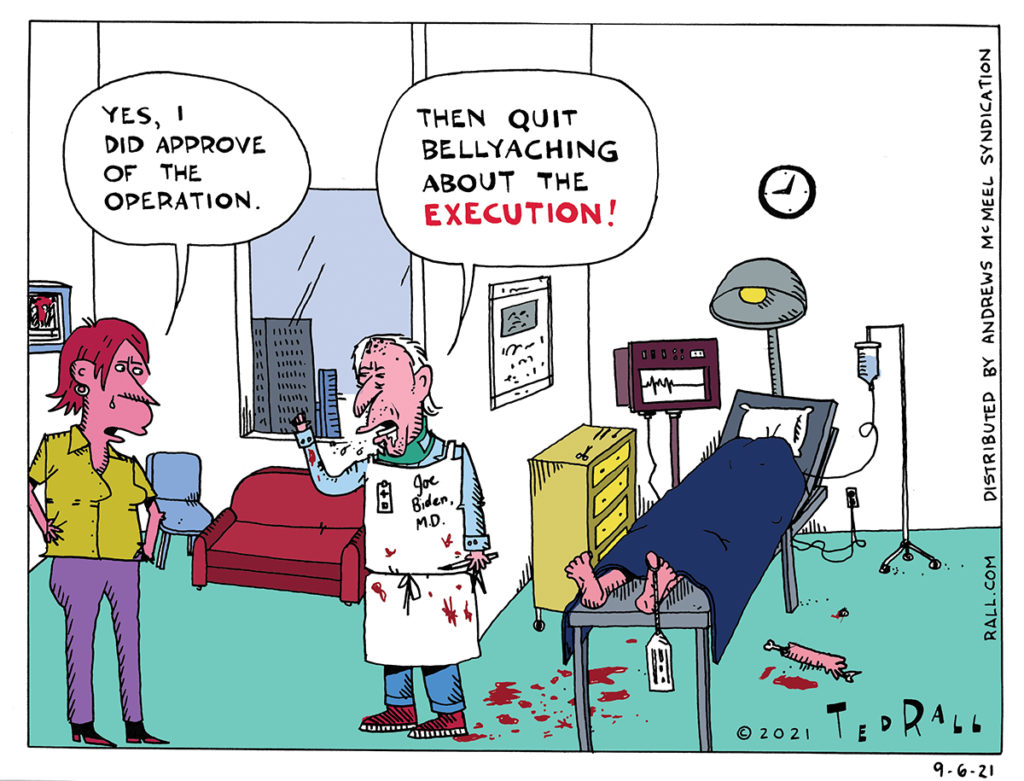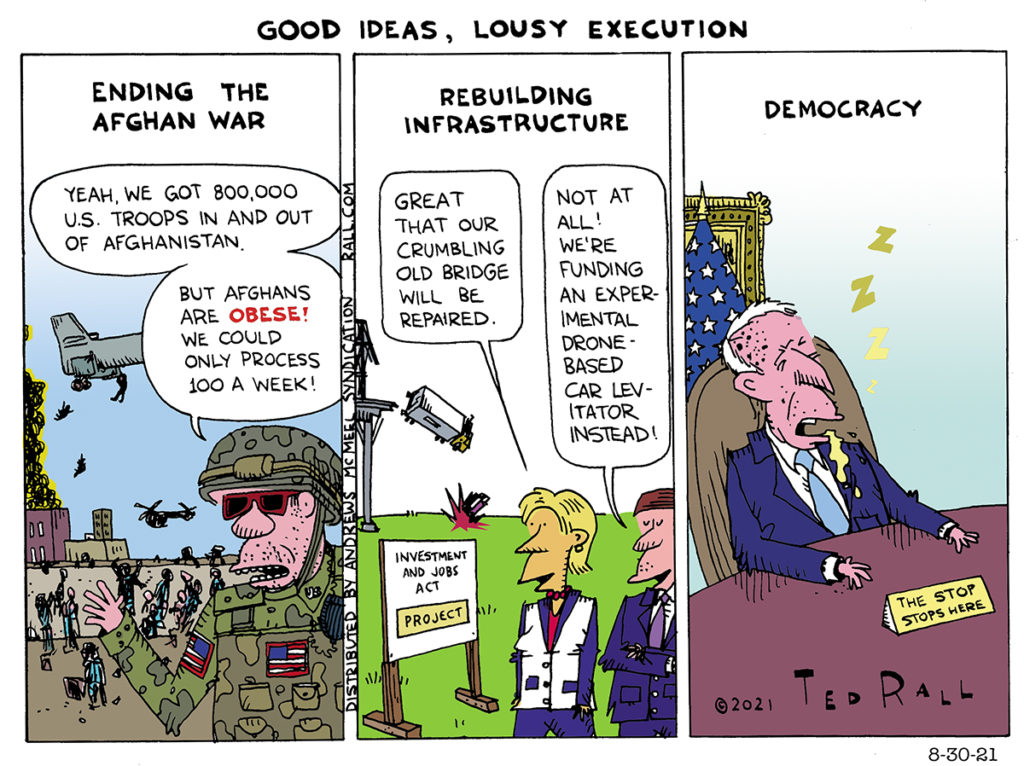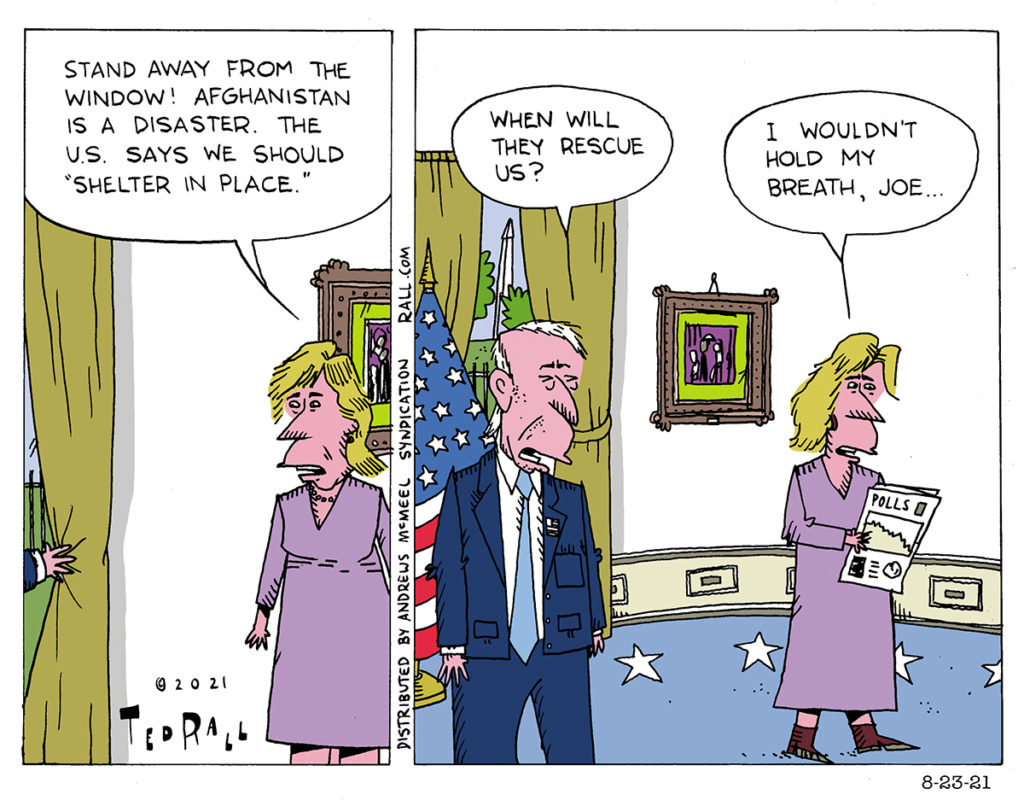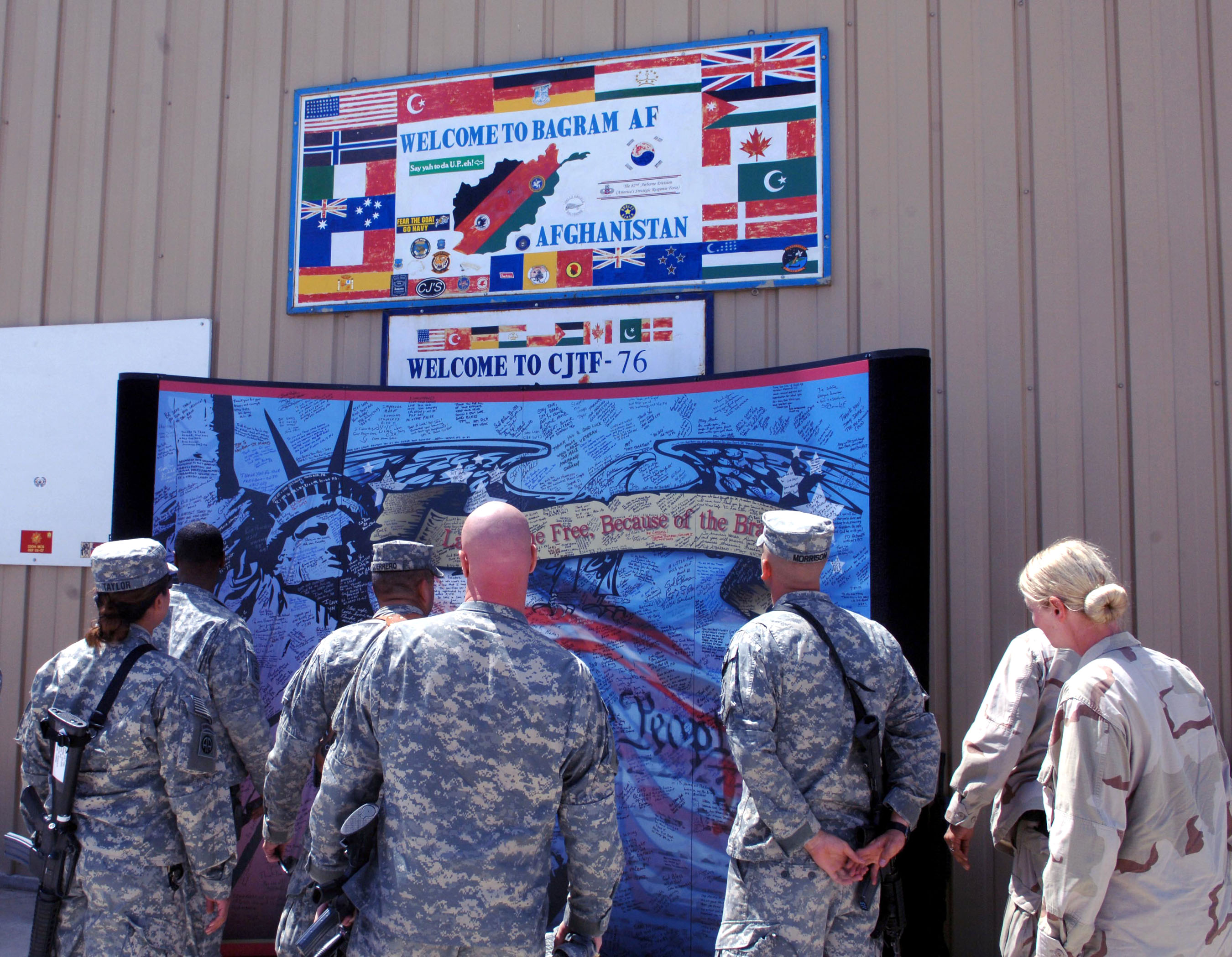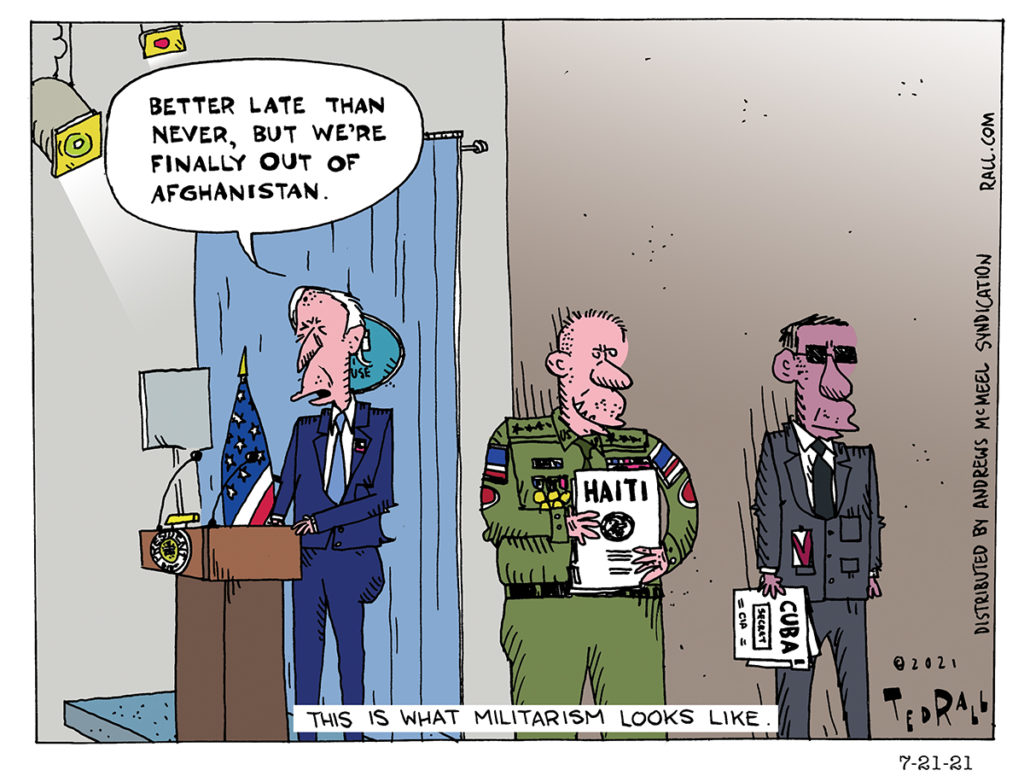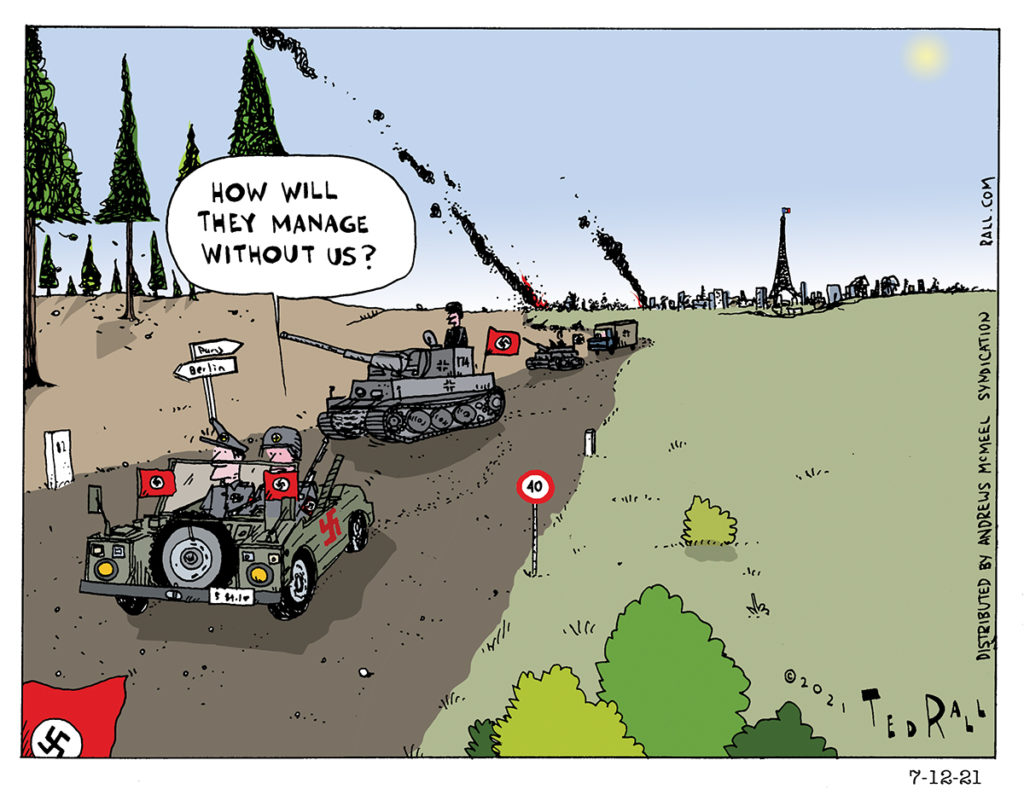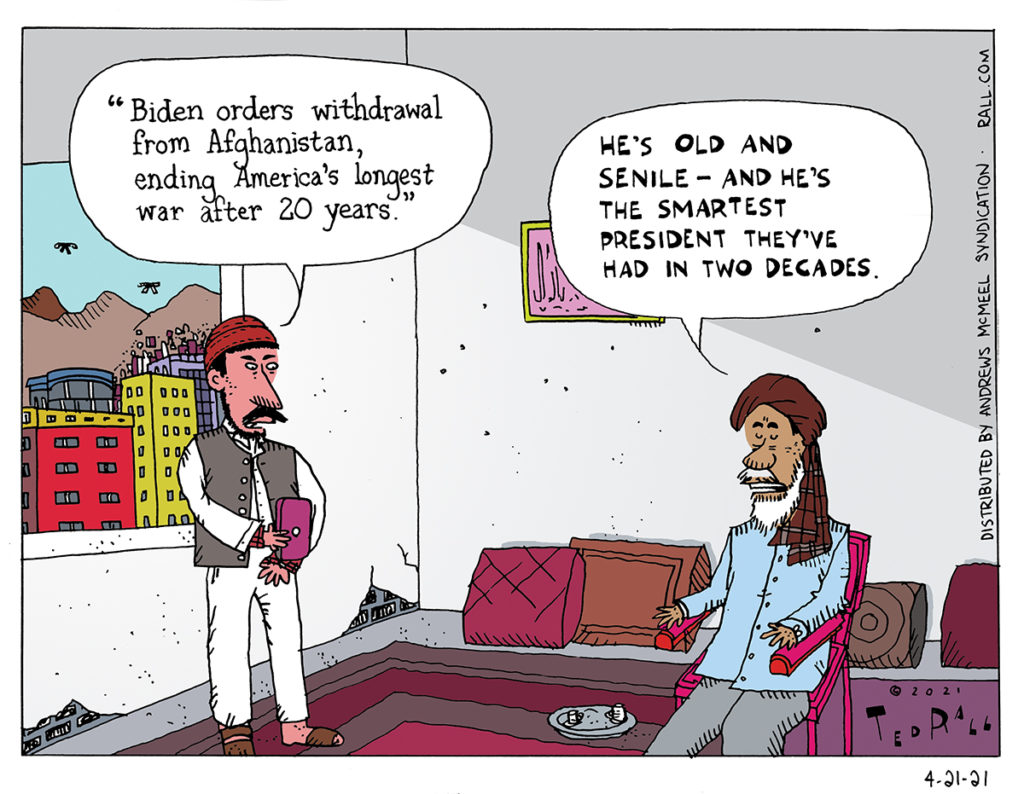Joe Biden and his defenders say a messy evacuation from Afghanistan was inevitable, though if that’s true, why didn’t they plan accordingly? Now they argue that criticism of the execution of the withdrawal is tantamount to remaining indefinitely.
9/11 Had Nothing to Do with Afghanistan
Better late than never: most Americans now believe that invading Afghanistan was a mistake. But what good does it do to recognize a screw-up unless you learn from it?
Failure to understand what went wrong, and why, sets you up for doing the same thing later. That’s what happened after Vietnam; rather than face up to the truth that we went there to prop up a corrupt puppet regime and exploit natural gas, we wallowed in ridiculous “Rambo” mythology about politicians stabbing our valiant warriors in the back by not allowing them to win, and libels of vicious hippies who supposedly spat on veterans returning to their hometown airports. (Never happened.)
It’s tempting to kick the dust of Afghanistan off our metaphorical boots and, as Americans prefer, look forward rather than backward. But an advanced civil society requires an after-action report. That’s what the military and other organizations do after an engagement in an intelligent effort to repeat what worked and avoid what didn’t.
Unless we conduct a sober reassessment of Afghanistan, ideally in the form of a congressional investigation, there is nothing to indicate that we wouldn’t start a similarly stupid war again in the future. That’s because the invasion and occupation of Afghanistan was based on a big lie — and that lie is still circulating as widely as it was when the first bombs started raining down on Kabul in October 2001. If we want to avoid another $2 trillion war that claims thousands of American lives, we have to drive a stake through that BS narrative.
Big Lie: Afghanistan and the war against it was revenge for 9/11.
American voters like wars that are framed as righteous retribution against unprovoked acts of naked aggression, like the Spanish-American War (“remember the Maine!”) and World War II in the Pacific (“remember Pearl Harbor!”). Never mind that we invaded Cuba over an accidental explosion that Spain almost certainly had nothing to do with and that a U.S.-led oil embargo drove Japan to the desperate act of bombing Hawaii. A war that seems to come out of thin air, like the Bush Administration’s 2003 invasion of Iraq, on the other hand, prompts big protests and widespread opposition.
So it’s easy to see why the White House and its press allies marketed the Afghan war as revenge against Al Qaeda. We were attacked. It was unprovoked (not really, but that’s what Americans thought). We had to strike back.
Al Qaeda was based in Pakistan. 9/11 was planned in Pakistan. Osama bin Laden, the man held most responsible, lived in Pakistan. Much of the money came from Saudi Arabia, by far the largest international funding source of radical Islamic fundamentalism. The hijackers were Saudi and Egyptian. Not a single hijacker was Afghan. The hijackers had attended training camps in Afghanistan for jihad generally, not 9/11 specifically. If we were interested in getting even for 9/11, we would have attacked Pakistan or Saudi Arabia instead.
This information is well-known and widely available. Yet President Joe Biden, who deserves accolades for sticking to his guns and pulling out U.S. troops, chose September 11, 2021 as the final deadline for the withdrawal and the official end date of the war. “Setting the 9/11 date…underscores the reason that American troops were in Afghanistan to begin with — to prevent extremist groups from establishing a foothold in the country again that could be used to launch attacks against the U.S.,” the Associated Press reported on April 14th.
“Again”?!
There it is, 20 years later, the big lie again. 9/11 wasn’t planned by terrorists from a “foothold” established in Afghanistan. It was planned by terrorists from a foothold established in Pakistan, specifically in the city of Karachi, precisely at the home of Khalid Sheikh Mohammed.
In total opposition to the facts, Biden keeps repeating the big lie. “As I said in April, the United States did what we went to do in Afghanistan: to get the terrorists who attacked us on 9/11 and to deliver justice to Osama Bin Laden, and to degrade the terrorist threat to keep Afghanistan from becoming a base from which attacks could be continued against the United States. We achieved those objectives. That’s why we went.”
Afghanistan never was a “base” of attacks against the United States; said attacks couldn’t possibly “continue” because there never were any originating from Afghanistan. Bin Laden, of course, was assassinated in Pakistan. Which is an entirely different country from Afghanistan. And no, we didn’t follow any trail from Afghanistan to Pakistan.
Biden piles on the lies. People remember symbolism.
Choosing the 20th anniversary of the 9/11 attacks as the official withdrawal date was the White House’s way to reinforce the long-standing national slander against Afghanistan, while leaving our frenemies Pakistan and Saudi Arabia off the hook.
We have got to stop talking about 9/11 and Afghanistan in the same breath.
The lie that links Afghanistan to 9/11 is so powerful that even people on the progressive left bought into it. Only one member of Congress, Barbara Lee of California, had the courage and brains to vote against the Afghanistan war. The antiwar left cobbled together a few pathetic protest demonstrations during the September-October 2001 run-up to the U.S. invasion, but their number and turnout was a tiny fraction of those who marched against the Iraq War. Even now that it’s clear that both wars were equally unjustified and based on lies, liberals get much more agitated over Iraq than Afghanistan.
As usual, the media is the guiltiest cog in the machine of militarism. “Americans like me ignored—or scorned—protesters who warned of an endless quagmire in Afghanistan. Next time, we should listen to the critics,” Conor Friedersdorf kindly acknowledged in The Atlantic in 2019. Perhaps that will happen somewhere somehow. But not in The Atlantic. Like every other corporate media outlet, the magazine refuses to hire me or any other writer or artist who criticized the Afghanistan war when everyone else was all in.
(Ted Rall (Twitter: @tedrall), the political cartoonist, columnist and graphic novelist, is the author of a new graphic novel about a journalist gone bad, “The Stringer.” Now available to order. You can support Ted’s hard-hitting political cartoons and columns and see his work first by sponsoring his work on Patreon.)
This Is What the Cult of Militarism Looks like
Fortunately, president Joe Biden followed through on last year’s peace deal with the Taliban and has ordered a complete withdrawal from Afghanistan. A war we never should have been in in the first place is coming to an end. But militarists are waiting in the wings with new ideas for mayhem for profit.
How Will They Manage without Us?
As the United States completes its pullout from Afghanistan, the usual suspects worry aloud that the country won’t be able to manage without us. What they and other people with a neo-colonialist mentality don’t realize is that Afghanistan is a sovereign country and that we have been interfering with it unnaturally for 20 years.
Abandon Afghanistan and Don’t Look Back

Joe Biden deserves nothing but praise and support for his decision to honor America’s commitment, negotiated between the Trump administration and the Taliban, to finally withdraw from Afghanistan. After more than 20 years of wasted lives, endless property damage and squandering of billions of U.S. tax dollars that would have been better spent on just about anything else you could think of, it’s incredible that corporate media is still giving airtime to the idiots and warmongers who want to keep troops over there. “I have heard general after general, as you have, say, just give us a little more time,” ABC’s Martha Raddatz said July 4th.
It’s been two decades. There was no legal or moral justification for the war to begin with. They’ve had too much time as it is.
For those of us who have been closely connected to America’s longest war last week’s abandonment of Bagram airbase, the biggest U.S. facility in occupied Afghanistan, makes the long-promised withdrawal feel real.
And the hand-wringing over what comes next has built to a fever pitch. Will the Taliban come back? Will it be like 1997 all over again, with women subjugated and horribly oppressed? Will the Taliban kill the translators, fixers and other Afghans who worked for U.S. occupation forces? Will Afghanistan once again become a staging ground for terrorist attacks like 9/11?
Some of these questions are reasonable. Others couldn’t be less so, based as they are on assumptions fed by lies.
What’s important to remember is the motivation for sewing these doubts. The military industry and its pet media outlets want to change our minds about withdrawal or, if they fail to do so for now, to set the stage for ground troops to invade again in the near future.
Afghanistan will not “again” become a staging ground for terrorist attacks against the United States or any other Western power because it was hardly one in the first place. In 2001 there were four Al Qaeda training camps in Afghanistan; there were 6,000 in Pakistan. On 9/11 Osama bin Laden was almost certainly in Pakistan, not Afghanistan. The attacks were planned by Khalid Sheikh Mohammed in Pakistan. Most of the funding came from the royal family of Saudi Arabia, as did 15 of the 19 hijackers; none came from Afghanistan. It is true that the hijackers all trained in Afghanistan but that’s a distinction without a difference; they could just as easily have picked up the same education in Pakistan, where 99% of Al Qaeda’s infrastructure and personnel had been situated.
There is good reason to worry about the immediate future after we leave. It is likely that the Taliban will quickly topple the militarily inferior and wildly unpopular U.S. puppet regime installed by the George W. Bush Administration. Neighboring countries are bracing for flows of Afghan refugees; hundreds of Afghan government soldiers have already fled to Tajikistan. Violence is inevitable: military casualties in the civil conflict, reprisals against political opponents and repressive acts against women and other targets of Muslim fundamentalists. But nothing can change the truth: Afghanistan is not a U.S. colony. It is a sovereign nation. As such, it has the right and duty of self-determination. The Afghan people must sort out amongst each other what kind of future they want to have.
In the event of a Rwanda-scale genocide, intervention could be justified in conjunction with an international force under the auspices of the U.N. At this writing, however, that seems unlikely. The Taliban are far more sophisticated, younger and modern than the regime that took over Kabul in 1996. So is the population that they seek to govern. Afghans are interconnected with the wider world and its culture via the Internet and cellular phones. They are Muslim extremists, but they are far more pragmatic than ISIS. Afghanistan under the Taliban will feel more like Pakistan than ISIS-held Syria. As is currently the case, rural areas will be more conservative—burqas, girls banned from schools, the occasional stoning—than the cities.
Certainly the United States has the moral obligation not to repeat its habit of discarding its local employees after withdrawal. We should offer green cards and economic support to our Afghan collaborators on an expedited basis rather than the shameful foot-dragging that has been reported. Otherwise the Taliban may execute them as traitors.
Be prepared, as Biden’s September 11, 2021 deadline for withdrawal of the last U.S. troops draws closer, for a rising chorus of voices calling for him to change his mind. Don’t abandon Afghanistan again, the war pigs will cry.
Don’t listen to their siren song of imperialism. The invasion was a mistake, the occupation was a mistake, and so was our propping up of our corrupt puppet regime. We never should have been there in the first place and it has taken 20 years too long to get out.
(Ted Rall (Twitter: @tedrall), the political cartoonist, columnist and graphic novelist, is the author of a new graphic novel about a journalist gone bad, “The Stringer.” Now available to order. You can support Ted’s hard-hitting political cartoons and columns and see his work first by sponsoring his work on Patreon.)
Afghanistan Under the Taliban: It Won’t Be Like Last Time
We’ve been in Afghanistan 20 years, Joe Biden’s generals told him. All we need is a little more time. The president overruled them, ordering a complete withdrawal of American troops by September 11th.
Madiha Afzal and Michael O’Hanlon of the Brookings Institution articulate the opposition to Biden’s decision to call it quits. Remove the U.S. occupation forces that have maintained stability, they worry, and civil war will soon follow, culminating in the overthrow of the U.S.-backed government in Kabul and the return of the Taliban. They think it will be the late 1990s all over again: women back under burqas, stonings, 14th century Islam providing a safe haven for anti-Western terrorist groups like Al Qaeda.
“The most likely outcome of any quick troop exit this year is very ugly, including ethnic cleansing, mass slaughter, and the ultimate dismemberment of the country,” Ms. Afzal and Mr. O’Hanlon write in USA Today. “No one can see the future, of course, but this type of outcome seems much more likely than any smooth transition to a new government run by a kinder, gentler, more moderate Taliban.” They urge a slower long-term drawdown.
I think they’re wrong.
I’m not clairvoyant. Yet I did foresee that the U.S. would follow the British and Soviet armies and meet defeat in the Hindu Kush: “We’ve lost this war, not because they’re good or we’re not, but because of who we are,” I wrote from Afghanistan in December 2001, where I worked as an unembedded reporter for The Village Voice. “The American Empire can’t spend the bodies or the time or the cash to fix this crazyass place, because in the final analysis, election-year W. was right—we’re not nation builders.”
Unlike the Brookings authors I’m more optimistic about Afghanistan without U.S. occupation forces than with them. First, whatever stability the U.S. and its allies have brought to Afghanistan is as artificial as the finger of the Dutch boy plugging the hole in the dike. The rural-based Taliban are like the sea, an inevitable force waiting to pour in. Whether or not we care for the end result, we can’t forestall the inevitability of a people’s self-determination at the cost of American and Afghan lives.
More importantly, the coalition presence has changed Afghanistan forever. When the Taliban ran most of the nation from 1996 to 2001, their draconian measures satisfied a desperate need for security in a place overridden with banditry, opium trafficking and addiction. Infrastructure was nonexistent: no phones, no electricity, no paved roads, no central monetary system. Afghans asked me to take their photos with my digital camera because no one owned a mirror; this was the first time in their lives they could see themselves.
Though security remains an issue, the coalition has built roads and highways throughout the country. We haven’t built a nation. But we have installed stuff. Cellphone service is more reliable and affordable than in the U.S. Cities like Kabul, Mazar-i-Sharif and Herat are bursting at the seams with new construction. Access to the Internet is widespread in urban areas. Mineral and oil reserves, previously untapped due to lack of capital investment, are beginning to come online thanks to China and other countries.
Two decades of occupation have changed culture in surprising ways. Herat, in the northwest near the borders with Turkmenistan and Iran, was dotted with pizzerias when I was there in 2010. Young men in Mazar brazenly ignored strictures against drinking and eating during the daytime during Ramadan. I saw a couple making out in a park in Kabul.
The Taliban, or more precisely the neo-Taliban who have replaced them, are more moderate because they operate in a modernized environment.
Though they share their name and religious fundamentalism with their ascetic forebears who grew up in the madrassas lining Pakistan’s tribal areas, today’s neo-Taliban are sophisticated cynics, men more concerned with making money then enforcing sharia law. The Taliban burned poppy fields. The neo-Taliban profits from them. The Taliban first gained popular support in 1996 by killing kidnappers. The neo-Taliban runs checkpoints and ambush points where they seize victims and hold them for ransom. So while the world has just cause for concern about what happens next, we should understand that forthcoming evils will be new ones, not a simplistic replay of Taliban 1.0.
In a country where every gunman is for hire, the regime installed by the United States in 2001 relies far more on funding than direct military defense. With more than $12 billion in aid pouring in from last year through 2024, the government led by Ashraf Ghani could easily outlive most expectations. Still, it’s not hard to imagine the U.S. and its Western allies losing interest and cutting the cash flow after 2025, opening a power vacuum that the Taliban—which either fully controls or vies for control of 67% of Afghan districts—would fill.
Concern that Afghanistan will return to the barbarism of the late 1990s and that Afghan women will suffer dramatic setbacks is misleading because, in the rural majority of the country, the politics and culture of the late 1990s never disappeared. Women never stopped wearing the burqa and continue to be stoned to death, most recently last year in Ghor Province. Young boys are routinely raped, a practice to which American troops were ordered to turn a blind eye. Were the Taliban to return to national power, life in most of Afghanistan wouldn’t change.
Nor would the more liberal cities be greatly affected. Afghanistan’s economy generates nearly $20 billion in annual GDP. An incoming national government run by the profit-oriented neo-Taliban would be hesitant to interfere with the engine of that economic activity, the big cities and the “ring road” highway network that connects them. We would probably see a crude version of the “one country two systems” form of governance that China uses in Hong Kong: girls schools and tolerance for personal freedoms in central Kabul, sharia law and grinding poverty out in the sticks.
As demonstrated by their engagement in the Doha peace process overseen by the Trump Administration, the neo-Taliban want trade and formal diplomatic ties with other countries, something the Taliban could not obtain from 1996 to 2001, when they were totally isolated from the rest of the world. The need to maintain international connections would be a moderating influence, making worst-case scenarios like harboring extremist groups, ethnic cleansing and disintegration unlikely.
None of this is to say that Afghanistan will become a Central and South Asian paradise if and when the neo-Taliban come to power in Kabul. The corrupt and dogmatic neo-Taliban will likely function as an authoritarian narcostate with trappings of rough religiosity, like a hardscrabble Saudi Arabia that exports heroin. Afghanistan will present new challenges. But it will be mostly up to the people of Afghanistan—traumatized, energetic and influenced by 20 years of Western values—to address them.
(Ted Rall (Twitter: @tedrall), the political cartoonist, columnist and graphic novelist, is the author of the upcoming graphic novel about a journalist gone bad, “The Stringer.” Now available to order. You can support Ted’s hard-hitting political cartoons and columns and see his work first by sponsoring his work on Patreon.)
Trump Tries to End the Afghanistan War, Democrats Want to Keep Killing

Pollsters have observed a consistent enthusiasm gap between supporters of President Trump and former Vice President Joe Biden. Any factor that dampens Democratic turnout could contribute to a second come-from-behind victory for the GOP.
Adding to liberal voters’ ambivalence over Biden is a rarely-discussed aspect of Trump’s presidency. Trump’s skepticism of foreign military entanglements places him to the left of mainstream Democrats like Biden. His foreign policy aligns more closely to those of the progressives who are licking their wounds from the primary defeat of Bernie Sanders—and who are considering whether or not to vote at all.
In 2016 Trump upended traditional right-wing politics by campaigning against the Iraq War—during the Republican primaries, where candidates usually compete to look tough. This year the surprise dove can take credit for extricating the U.S. from its longest war, the 18-year-old meatgrinder of Afghanistan. Not only was Trump the first post-9/11 president to hold direct talks with the Taliban, he concluded a peace deal with the insurgency that leads to a total American withdrawal by April 2021 if the Taliban uphold their commitments. Now he is even considering an accelerated timetable that would bring back the last American soldier before Election Day.
Enter the war pigs.
Trump’s peace initiative is under attack by an odd coalition of neoconservative Republicans including Rep. Liz Cheney of Wyoming and a group of Democratic hawks who inserted an amendment to the latest National Defense Authorization Act. The add-on denies the president funding to bring back the last 8,000 troops. In order to get the money the Defense Department would have to certify that pulling out would not increase the chances of Afghanistan ever becoming a safe haven for terrorists in the future. How could they promise that?
“There were elements of the progressive left and the pro-Trump right who supported these withdrawals,” Glenn Greenwald noted in The Intercept, but they lost the House fight.
Trump is no one’s idea of a pacifist. He expanded the drone assassination program he inherited from Obama and reduced its already low transparency. He supports Saudi Arabia’s vicious proxy war in Yemen. He has engaged in old-fashioned gunboat diplomacy against China.
Even so, many progressives find more to like in Trump’s willingness to engage with the leaders of countries like North Korea and Iran. Prior to Trump, high-level negotiations were positioned by the U.S. as rewards for improved behavior; Trump talks without preconditions. Progressives prefer diplomacy to war.
Biden, on the other hand, voted to bomb Serbia, invade Afghanistan and Iraq. He has never apologized—so it’s reasonable to assume he’d commit the same crimes again. He sat at Obama’s side as that administration armed and funded radical jihadis in Libya and Syria, expanding regional conflicts into all-out civil wars, one of which created the vacuum filled by ISIS. American leftists support Nicolás Maduro, a socialist, in Venezuela; Biden backs Juan Guaidó, who failed to seize power in a military coup last year. These are Hillary Clinton’s politics, an approach left-leaning voters despise.
“The liberal establishment is desperate to return a centrist to the White House in November and reestablish the country’s more stable military dominance of the world order, disrupted only briefly by Donald Trump. Joe Biden’s terrible track record on foreign policy — including his championing of war in Iraq — suggests a return to Obama-style strong military interventions abroad,” David Davison and Alex Thurston wrote recently in Jacobin.
“Biden represents the return of the classical foreign policy establishment,” Alan Minsky, executive director of Progressive Democrats of America, told The Progressive magazine. “Biden is running a campaign as a restoration candidate.”
And while Biden has made overtures to the progressive wing of his own party on such domestic issues as healthcare and the environment, he has expressed no willingness to compromise on foreign policy.
Last week a coalition of progressive groups wrote to Biden to demand that he appoint anti-interventionists to his cabinet and as top officials in the State Department. “Without national security and foreign policy personnel who are willing to learn from the mistakes of the past and understand the need for change this moment presents, we fear our country—and the world—risk descending into climate and economic chaos fueled by further corruption and authoritarianism. We expect a potential Biden administration to reflect the urgency of this moment in its personnel appointments,” the letter read.
I would not hold my breath.
(Ted Rall (Twitter: @tedrall), the political cartoonist, columnist and graphic novelist, is the author of the biography “Political Suicide: The Fight for the Soul of the Democratic Party.” You can support Ted’s hard-hitting political cartoons and columns and see his work first by sponsoring his work on Patreon.)

